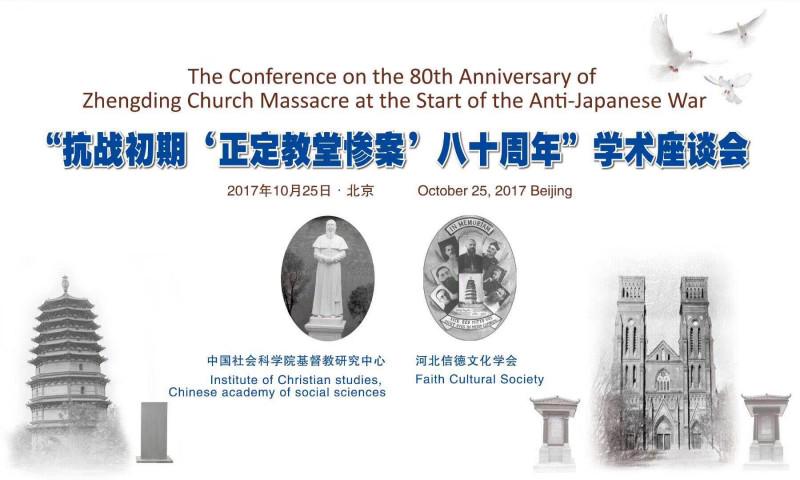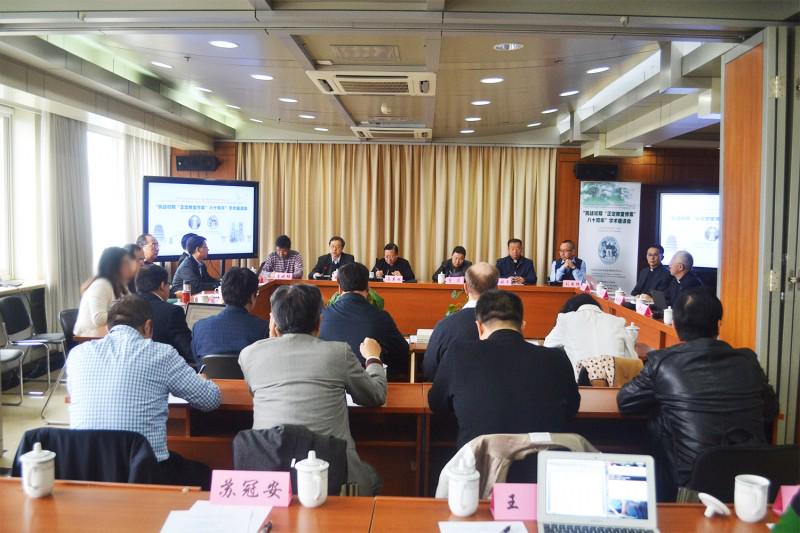The Conference on the 80th Anniversary of the Zhengding Church Massacre at the Start of World War II was held in the Institute of World Religions (IWR) of the Chinese Academy of Social Sciences on October 25, 2017. It was co-sponsored by IWR and the Hebei Faith Cultural Society. More than 30 people, including Ma Yinglin, president of the Bishops Conference of the Catholic Church in China, and Zhuo Xinping, director of IWR, attended it.
Four sessions were conducted to explore two themes --- the truth about the massacre of Zhengding Church and the real significance of the massacre. The conference was to commemorate Bishop Frans Schraven and his eight European companions. The martyrs were murdered in China on 9 October 1937 by the Imperial Janpanese army while protecting hundreds of Chinese women and girls hidden in Zhengding church.
In the opening ceremony, Zhuo said that Catholicism shared the same outlook and destiny as Chinese people and the massacre showed the fraternity and divine love of the Catholics for protecting people. Recalling the communication of the relatives of Bishop Schraven, Ma declared that he said to them, "Although the Catholic Church didn't canonize Bishop Frans Schraven, he is already a saint among the Chinese people."
Truth of the Massacre
Professor Li Chen was one of the earliest Chinese to encounter the incident. In 2004, she happened to see an article about the massacre released on Yishi Newspaper in 1946 while collecting material for her doctoral dissertation. Later, she contacted Dr. Vincent Hermans, grandnephew of Bishop Schraven. The latter sent related material gathered from European archives and libraries to her. Dr. Hermans also searched for information from the Japanese friend Mr. Anthony Yasufumi Matsukuma, but little was found. He believed that Japan tried to conceal the issue.
Li stated that Japan didn't claim responsibility for the massacre in its report at the time but blamed Chinese people for the killing. She concluded that the Japanese army was at fault and the reason for the massacre was that the missionaries protected Chinese refugees, especially young women. She called on further research for relevant material to verify whether her inference was true.
Dr. Liu Guopeng from IWR claimed that Japan was responsible for the tragedy, based on related materials he collected in 2013, during key research on organizing a systematic catalog of the Chinese church archives since the foundation of the Sacred Congregation for the Propagation of the Faith of the Roman Curia.
He pointed out, "In 1937, the Directorate-General for Political Affairs of the Netherlands Ministry of Foreign Affairs and Japan came to an agreement where Japan agreed to compensate for the murder of Frans Schraven and his companions. "Father Zhang Shijiang, director of the Faith Institute of Cultural Studies based in Hebei, said that the Japanese said that soldiers from North Korea and Manchu working for them killed the missionaries. It approved the compensation and building tombstones for the martyrs, but the cunning people didn't leave their names on the gravestones.
The massacre's realistic significance
Professor Li Qiuling from Renmin University of China said that the love revealed in the missionaries' sacrifice of protecting women and children mattered more than clearing the air.
Priest Zhao Jianmin, vice-bishop of the Roman Catholic Archdiocese of Beijing, endorsed Li's remark. He held that we should pay attention to fraternity manifested in the sacrifice, emphasizing the underlying facts. "Their fraternity was shown in their opening the church's door for refugees in the war." she continued, "the essence of Catholicism lies in her universal fraternity, protecting the weak."
Bishop Yang Xiaoting, the exectuive vice-president of the National Seminary of the Catholic Church in China, saw the spirit and value of the Catholic faith reflected in society. She said, "The church plays the role of presenting fraternity, justice, and peace in different historical periods."
Note: below are the names of the nine victims of the Zhengding Church Massacre:
Bishop Frans Schraven, CM (1873-1937), Dutch;
Fr. Thomas Ceska, CM (1872-1937), Austrian-Croatian;
Bro. Antoon Geerts, CM (1875-1937), Dutch;
Fr. Emmanuel Robial, OCSO (1884-1937), French Trappist;
Fr. Lucien Charny, CM (1882-1937), French;
Mr. Anton Biskupič, (1886-1937), Austrian-Slovakian;
Fr. Eugène Bertrand, CM (1905-1937), French;
Fr. Gerrit Wouters, CM (1909-1937), Dutch;
Bro. Wladislaw Prinz, CM (1909-1937), Polish.
- Translated by Karen Luo















